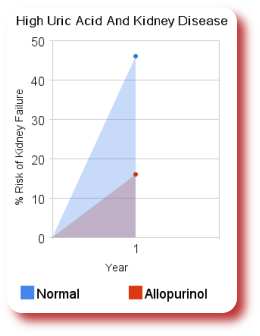Does Allopurinol affect Kidneys explains how taking allopurinol tablets might affect kidney disease. Specifically, I explain how this is an area of ongoing gout research. Because scientists do not yet fully understand how allopurinol affects kidney function. However, the results so far seem encouraging. Because some kidney patients benefit from allopurinol. But for others, there is no effect on kidneys.
Does Allopurinol affect Kidneys Purpose
I wrote Does Allopurinol affect Kidneys for GoutPal Patients who are concerned about the effects of allopurinol on kidney function. So this supports the Purpose of GoutPal.com by giving you information to help you discuss your kidney function concerns with your doctor.
If you are not sure which type of gout sufferer you are, please read Questions for Gout Sufferers before you continue to read this article. Also, see the related links below for more pages about allopurinol and kidneys.
Allopurinol Tablets & Kidney Disease
Allopurinol tablets are the most important weapon in any gout patient’s arsenal.
Also, they could be more important, if you also suffer from kidney disease.
Because, gout related research from Y P Siu and colleagues[1] investigates allopurinol tablets and kidney disease. Specifically, it looks at allopurinol in patients with high uric acid levels and impaired kidney function.
They recognized that high uric acid (hyperuricemia) is associated strongly with the development of high blood pressure and kidney disease. So, they thought allopurinol might benefit gout patients with chronic kidney disease.
First, they conducted a randomized controlled trial with 54 patients. All had high uric acid levels and chronic kidney disease. Half were treated with allopurinol tablets (100 mg to 300 mg per day). While the other half continued with normal treatment.
Next, patients were assessed after 12 months. Then, 46% of normal patients had significant kidney deterioration or started dialysis. But, only 16% of those treated with allopurinol got worse.
Finally, the authors conclude:
Allopurinol therapy significantly decreases serum uric acid levels in hyperuricemic patients with mild to moderate chronic kidney disease. Its use is safe and helps preserve kidney function during 12 months of therapy compared with controls. Results of this study need to be confirmed with an additional prospective trial involving a larger cohort of patients to determine the long-term efficacy of allopurinol therapy and in specific chronic kidney disease subpopulations.
Does allopurinol cause kidney damage?
That report was published over 10 years ago. Yet, gout sufferers are still asking: “Does allopurinol cause kidney damage?” Now, the answer is “almost certainly not”. But, we don’t know why. Because the latest research[2] still claims “Recent meta-analyses [of allopurinol effects on kidneys], however, have produced inconsistent results”. Despite this limitation, results are encouraging on two counts:
Firstly, there is a link between lower uric acid from allopurinol, and reduced renal failure, in most studies. Secondly, there is a strong suggestion that additional kidney protection comes from inhibiting xanthine oxidase. Furthermore, this has led to more studies to investigate how allopurinol can benefit diabetes sufferers.
But these continuing studies have not yet produced a clear conclusion. For example, a recent report concluded[3]:
In patients with chronic kidney disease and a high risk of progression, urate lowering treatment with allopurinol did not slow the decline in estimated glomerular filtration rate as compared with placebo.
However, this has produced extensive discussions in medical journals about different aspects of measuring kidney disease responses.

Does Allopurinol affect Your Kidneys?
Clearly, the question “Does Allopurinol affect Kidneys” is too complicated for a simple answer. In practice this means you may need a team of specialists to assess your case. So make sure that the doctors responsible for your gout care are working with the doctors responsible for your kidney care.
Why not discuss allopurinol tablets for kidney disease in the gout forums?
Leave Does Allopurinol affect Kidneys to browse the Gout Disease pages
Does Allopurinol affect Kidneys Comments
GoutPal visitor responses and associated research include:
Does Colchicine have any effect on Kidneys?
Marjorie asked, “does the medicine colchicine have any effect on your kidney? I use colchicine
for the treatment of gout. I had to have my left kidney removed and I’m wondering if colchicine played a part in my having to do this?”
In my response, I said that the answer to “Does colchicine affect kidneys” is similar to allopurinol. Because there is conflicting evidence[4-6]. But it is clear that experts need to consider the exact nature of the patient’s kidney disease. Also, the colchicine research indicates the importance of dose. Which I didn’t pick up on in the debate about allopurinol with kidney disease.
Whenever you have two serious illnesses together you must rely on expert investigation and individual case management. Because every case is different. So you will not get the level of care you need from Internet articles.
Does Allopurinol affect Kidneys Related Topics
Please remember: to find more related pages that are relevant to you, use the search box near the top of every page.
Common Terms: allopurinol, Colchicine, kidney
Other posts that include these terms:
- When To Start Allopurinol
- Gout Medications To Avoid Gout By Lower Uric Acid
- Starting Allopurinol – Dosing Guidelines
- What Is Allopurinol?
- Allopurinol And Alcohol: Can You Spirit Away Gout?
- Gout Pain Relief in 2 Hours
- Allopurinol Rash: Are You At Risk?
Does Allopurinol affect Kidneys References
- Use of allopurinol in slowing the progression of renal disease through its ability to lower serum uric acid level. Siu YP, Leung KT, Tong MK, Kwan TH. Am J Kidney Dis. 2006 Jan;47(1):51-9.
- Time to target uric acid to retard CKD progression. Kumagai T, Ota T, Tamura Y, Chang WX, Shibata S, Uchida S. Clin Exp Nephrol (2017) 21:182–192.
- Badve, Sunil V., Elaine M. Pascoe, Anushree Tiku, Neil Boudville, Fiona G. Brown, Alan Cass, Philip Clarke et al. “Effects of allopurinol on the progression of chronic kidney disease.” New England Journal of Medicine 382, no. 26 (2020): 2504-2513.
- Kim, Sejoong, Eun Sook Jung, Jeonghwan Lee, Nam Ju Heo, Ki Young Na, and Jin Suk Han. “Effects of colchicine on renal fibrosis and apoptosis in obstructed kidneys.” The Korean journal of internal medicine 33, no. 3 (2018): 568.
- Ben-Chetrit, Eldad. “Colchicine.” In Textbook of Autoinflammation, pp. 729-749. Springer, Cham, 2019.
- Zhong, Hongzhen, Zhiqing Zhong, Hongyan Li, Tianbiao Zhou, and Weiji Xie. “A rare case report of heavy dose colchicine induced acute kidney injury.” BMC Pharmacology and Toxicology 19, no. 1 (2018): 69.
Please give your feedback
Did this page help you? If yes, please consider a small donation. Your donations help keep GoutPal's gout support services free for everyone.
If not, please tell me how I can improve it to help you more.
- YouTube
- The gout forums.











